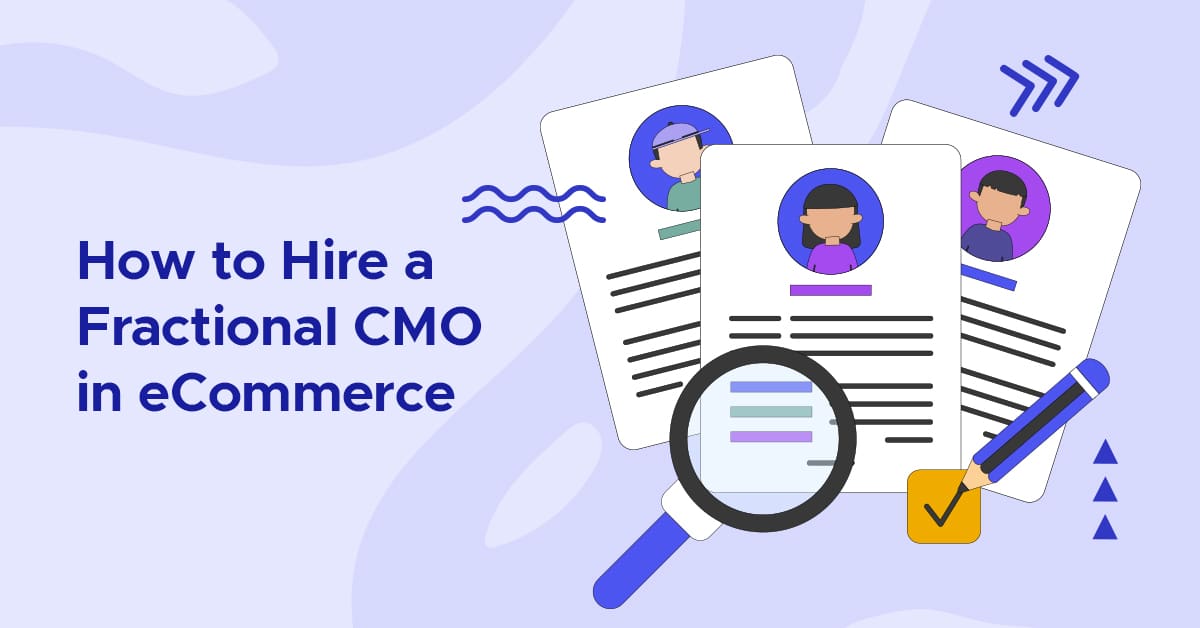
How to Hire a Fractional CMO in eCommerce

Consumer behavior and market trends evolve at lightning speed in the eCommerce industry, making a solid marketing strategy mandatory for a business to thrive. A fractional chief marketing officer (CMO) can be an asset to developing and implementing an air-tight plan, as they inject expertise and innovation into your marketing efforts.
This role features an experienced marketing professional who works on a part-time or project-based arrangement to provide strategic leadership, planning, and execution for your marketing initiatives. Unlike a full-time hire, a fractional CMO offers flexible engagement so you can tap into their expertise without the constraints of a long-term commitment. This approach is gaining traction in the business world and particularly in eCommerce, which prizes agility and adaptability.
From social media campaigns and search engine optimization (SEO) to email marketing and user experience, a robust marketing strategy necessitates a diverse skill set to return positive results, which is what makes fractional CMOs so enticing. However, finding and securing top talent for this position is more difficult than for an entry-level or more generalized role. But have no fear — we’ll walk you through the various steps of attracting and hiring a fractional CMO to help you hone in on your ideal candidate.
How to recruit a first-rate fractional CMO
Hiring a fractional CMO who fits your eCommerce business requires a strategic approach tailored to your unique needs. We’ve broken down the process to help you find a professional who aligns with your goals and effectively supports your marketing endeavors.
Define your needs and goals
Review your business objectives and challenges to identify the specific skills, experience, and expertise you need from an outside consultant. Define the outcomes you expect from the role, such as boosting sales, improving brand awareness, launching new campaigns, etc.
Draft a thorough job description
Craft a comprehensive job description that outlines the responsibilities, required skills, and expectations for the fractional CMO position. Clearly define the scope of the contract, including the duration of the project, expected deliverables, and potential extensions.
Choose the right platform
You can post your job description or actively recruit in many places. Freelance platforms like Upwork, Freelancer, or Fiverr provide access to a pool of experienced fractional CMOs. Explore industry-specific networks, forums, and LinkedIn groups as well to find professionals with expertise relevant to your eCommerce niche.
Review portfolios and past work
Comb through the portfolios of potential candidates to gauge their experience, range of skills, and past successes. Look for fractional CMOs who’ve worked on projects similar to your business model or marketing goals.
Conduct interviews and assessments
When interviewing candidates, skip generic, surface-level questions. Instead, delve into their experience and approaches to marketing challenges to determine their alignment with your business values. Consider posing real-world scenarios to assess the potential hire’s problem-solving skills and strategizing abilities.
Evaluate cultural fit and communication skills
It’s important to determine how well a candidate’s work style and values fit your business culture. They might have an impressive resume, but if they themselves don’t match your workflow and environment, they won’t be able to realize their full potential.
In that regard, be sure to hone in on their communication skills, since clear communication is essential for a fruitful collaboration.
Negotiate terms and agreements
Explicitly define the job role’s scope, deliverables, and milestones in a legally binding written agreement. This is also the time to negotiate a fair compensation structure that reflects the value the fractional CMO will bring to your eCommerce business.
Set up your onboarding process
Orientation is your chance to introduce the fractional CMO to your team, business goals, and existing marketing initiatives. You also need to provide them with the necessary tools, resources, and access to required data to carry out their duties effectively.
The recruitment process for a fractional CMO involves careful consideration of your business needs, thorough candidate evaluations, and transparent communication. By following the above procedure, you can secure a professional who contributes to your eCommerce success with their strategic marketing expertise.
How to measure your fractional CMO’s performance
Once you’ve made the hire, you need to measure the fractional CMO’s performance to ensure their contributions support your eCommerce business goals and deliver meaningful results. That entails establishing key performance indicators (KPIs) and tracking relevant metrics to quantify their impact on your marketing activities.
Establish and track KPIs related to your business goals
Define KPIs that directly relate to your eCommerce business objectives, such as increased website traffic, higher conversion rates, or improved customer retention. Also, make them specific, measurable, achievable, relevant, and time-bound (SMART) to guarantee reliable numbers.
Then, monitor marketing-specific metrics like bounce rate, time on site, and conversion rates to gauge the effectiveness of the campaigns your CMO builds. Track revenue growth, customer acquisition costs, and the number of sales attributed to marketing initiatives as well to quantify their sales performance. To visualize their impact on brand awareness, measure social media engagement, brand mentions, and the growth of your online community.
Monitor campaign performance and engagement
The format a CMO chooses will determine which metrics you should track to determine how successful each campaign is:
- Email marketing: Evaluate email open rates, click-through rates, and conversion rates to assess the impact of email campaigns.
- Social media: Analyze engagement metrics including likes, shares, comments, and follower growth to measure the reach and resonance of the CMO’s social media efforts.
- Content performance: Determine the effectiveness of content marketing by assessing metrics like blog post views, downloads of resources, and engagement with educational content.
Gather customer feedback
You can also gauge your fractional CMO’s success by consulting outside opinions. For instance, collect feedback from customers through surveys, reviews, and social media comments to understand their perception of your marketing efforts.
Calculate your Net Promoter Score (NPS) as well to quantify customer loyalty and how likely they are to recommend your eCommerce business.
Conduct regular performance reviews
Schedule periodic reviews with the fractional CMO to evaluate their performance against your established KPIs and goals. Structure these reviews around objective measurements rather than subjective opinions to encourage unbiased assessments. Then, analyze the results and make adjustments as necessary; for instance, if you determine your goals for the fractional CMO are unrealistic, revise them so they’re more attainable but still drive positive results.
Celebrate achievements and address challenges
Acknowledge and celebrate the fractional CMO’s successes to foster a positive working relationship and motivation. That can include sending an email thanking them for their hard work or providing more tangible rewards. As necessary, address any challenges or deviations from the expected outcomes promptly, collaborating with the fractional CMO to develop feasible solutions.
Measuring the success of a fractional CMO requires a data-driven approach and a continuous cycle of evaluation and adjustment. By monitoring the right metrics and aligning their performance with your business goals, you’ll ensure your CMO’s marketing strategies are effective and contribute to your overall success.
Wrapping up — A fractional CMO is the boost your business growth needs
Leveraging the expertise of a fractional CMO offers a strategic advantage that can propel your business in the competitive eCommerce market. Review your circumstances and look for the signs that indicate a need for this external marketing assistance. A fractional CMO brings numerous benefits, including cost-effectiveness, access to diverse skills, flexibility, and strategic insight, that can position you for accelerated growth and adaptability.
The responsibilities of a fractional CMO encompass a wide range of functions, from strategic planning and campaign execution to market analysis and team leadership. Their contribution extends beyond traditional marketing efforts, making them an asset to achieve your business objectives. A fractional CMO is more than a consultant — they’re a knowledgeable partner who leverages innovation and expertise to yield lucrative results for your store.

